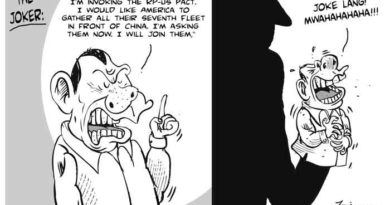OP-ED COLUMNISTS: OPINION ON PAGE ONE BY FRANCISCO TATAD – ‘A Spielberg movie for DU30’s Cabinet’
WHETHER or not they are familiar with the original story as it unfolded in 1971, President Rodrigo Duterte and his Cabinet would do well to watch “The Post,” Steven Spielberg’s current movie on The Washington Post’s decision to publish the top-secret Pentagon Papers, which record the US official effort to withhold from the American people terrible secrets about its involvement in the Vietnam war, as exposed by Daniel Ellsberg, a former US military analyst employed by RAND. It could give them a healthier respect for the idea of a free press, instead of looking at it as the enemy of government.
Beyond entertainment
The historical drama is masterfully crafted, and Meryl Streep as the Washington Post publisher Katherine Graham, and Tom Hanks as its executive editor Ben Bradlee deliver superb performances, which I am sure DU30 and his Cabinet would enjoy through the movie’s riveting 116 minutes. Its entertainment value aside, “The Post” has so much to teach even non-politicians about the correct relationship between government and the press. The press exists to serve the governed, not the governor, the film makes absolutely clear.
In 1967, Robert McNamara, who was defense secretary to John Kennedy and Lyndon Johnson from 1961 to 1968, and a good friend to Graham, commissioned a top-secret study on the role of the United States in Indochina, which was caught in a war in which some 59,000 American soldiers had already died. This produced a 47-volume 7,000- page document entitled “History of US Decision-making Process on Vietnam Policy.” Daniel Ellsberg helped produce this study, which alleged, among other things, that the US entered the war aware of the fact it had no way of winning it.
Ellsberg’s infamous leak
In March 1971, Ellsberg leaked 43 volumes of the study to reporter Neil Sheehan of The New York Times, and on June 13, 1971, the Sunday edition of the paper ran its first story based on the secret document. On June 15, 1971, at the request of the Nixon administration, a District Judge ordered The Times to cease further publication. The paper refused to cease publication, and on June 19, 1971, Judge Murray I. Gurfein of the US Court of Appeals for the Second Circuit rejected the administration’s request for an injunction.
On June 25, 1971, however, the Court of Appeals en banc granted the injunction, forcing The Times to cease publication. By then The Post had come into possession of the top-secret document from Ellsberg who leaked 4,000 pages of it to the Armenian-American political reporter Ben Bagdikin. To publish or not to the publish then became the critical question.
To right to publish vs the right to exist
Bradlee took the position that the only way to honor the right to publish was to publish. Some of Graham’s influential friends, however, warned her that publishing such explosive material could endanger the financial future of the paper, which had just got listed in the US stock exchange, and risk Graham’s and Bradlee’s prosecution for possible violation of the Espionage Act.
Section 793 of this Act made it criminal for: “Whoever having unauthorized possession of, access to, or control over any document, writing, code book, signal book, sketch, photographic negative, blueprint, plan, map, model instrument, appliance or note relating to the national defense, or information relating to the national defense which information the possessor has reason to believe could be used to the injury of the United States to the advantage of any foreign nation, willfully communicates, delivers, transmits or causes to be communicated, delivered or transmitted, or attempts to communicate, deliver, transmit or cause to be communicated, delivered or transmitted the same to any person not entitled to receive it, willfully retains the same and fails to deliver it to the officer or employee of the United States entitled to receive it.”
The decision to publish
After listening to Bradlee on the one hand and to her important friends on the other, Graham decided to publish. In one final conversation in her home one late evening, she calmly reminded her friends that the paper her father had started, and which her late husband used to run was no longer her father’s nor her husband’s but her own, and that her decision was to publish and then “go to bed.”
After the initial press run, US Assistant Attorney General William Rehnquist asked the Post to cease further publication of the classified document. When the paper refused, Rehnquist sought an injunction in the District Court for the District of Columbia. Meantime, all the other papers across the US followed the Post’s lead and carried the controversial story, transforming the Post into a national newspaper overnight.
The Supreme Court intervenes
Judge Gerhard Gesell rejected the government request, as did the Court of Appeals for the District of Columbia Circuit. This stood in contrast to the Court of Appeals injunction on The Times. Because of this inconsistency, the Supreme Court was forced to hear the case against the Times and the Post. The case was argued on June21, 1971 and decided on June 30, 1971. In a per curiam ruling, one issued by the court instead of one signed by a particular ponente, the court upheld the right of the Times and the Post to publish the classified document, saying that to exercise prior restraint the government must show that publication would cause grave and irreparable damage.
Three justices dissented, and six concurred; it was a victory for the First Amendment, which provides that Congress shall make no law abridging freedom of the press. Chief Justice Warren Burger led the dissent, joined by Associate Justices Harry Blackmun and John Harlan 2nd. Burger wrote that when the imperative of a free and unfettered press comes into collision with another imperative, the effective functioning of a complex modern government, there should be a detailed study on the effects of these actions. The Times should have discussed with the government the possible social consequences prior to publication, he said.
No prior restraint allowed
Associate Justices Hugo L. Black, William O. Douglas and Thurgood Marshall on the other hand maintained the view that “the courts lack the power to suppress any press publication no matter how grave a threat to the security it might pose.” For their part Associate Justices William Brennan Jr., Potter Stewart and Byron White ruled that the press could not be muzzled except to prevent direct, immediate and irreparable threat to the nation. And the material involved did not pose such a threat.
In his extended opinion, Black wrote: “In my view, far from deserving condemnation for their courageous reporting, the New York Times, Washington Post and other newspapers should be commended for serving the purpose that the Founding Fathers saw so clearly. In revealing the workings of government that led to the Vietnam war, the newspapers did precisely that which the Founders hoped and trusted they would do.” Paramount among the responsibilities of the press, Black pointed out, “is the duty to prevent any part of Government from deceiving the people and sending them off to distant lands to die of foreign fevers and foreign shot or shell.”
It was a total rout for the Nixon administration. As the movie ends, a voice that sounded like that of Nixon’s is heard saying, “No reporter of the Washington Post is ever again to be admitted into the White House, not even a photographer.”
The ban on Ranada
It sounded spookily like the current Malacañang ban on Rappler’s diminutive reporter Pia Ranada, whose only offense was her having tried to document Special Presidential Assistant Christopher “Bong” Go’s alleged attempt to intervene in the official acquisition of two P15.7-billion frigates from Heavy Hyundai Industries (HHI), which wants illegally to dictate the kind of Combat Management System to be installed on board the ships, without the prior approval of the Philippine Navy.
Unlike the Post’s case, that of Ranada has nothing to do with national security. It is a pure corruption issue. Bong Go dismissed Ranada’s exposé as “fake news” without showing how it became “fake news.” No one knows how long the ban on Ranada or Rappler will hold.
But apparently the threatened prohibition on the Post never held, for not long thereafter the Post reporters Carl Bernstein and Bob Woodward became the celebrated figures in Nixon’s infamous Watergate scandal, which broke out after a group of former FBI and CIA agents broke into the Democratic National Committee headquarters to listen to some phone lines and cart away some secret paperson June 17, 1972.
This ultimately led to Nixon’s resignation in 1974, the first such resignation of a sitting US president. The ban on Ranada and Rappler is not significant enough to provoke similar consequences. But this has not prevented some fairly anxious people from wishing the possibility could not be completely written off.
From Wikipedia, the free encyclopedia
.
NOTE : All photographs, news, editorials, opinions, information, data, others have been taken from the Internet ..aseanews.net | [email protected] | For comments, Email to : D’Equalizer | [email protected] | Contributor.












